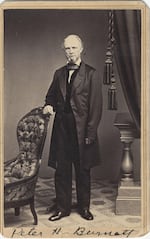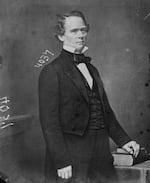Americans across the country have demonstrated for over a week now against systemic racism and police brutality. For many people, the protests have forced uncomfortable conversations about white privilege and the generations of prejudice against Black people and other people of color in the United States.

A group of KKK members parades down the streets of Grants Pass, Ore., in the 1920s. The KKK had a strong presence across the state in the early 1900s, with Oregon Klan leaders claiming 35,000 active members in 1923.
Lloyd Smith Collection
These conversations are happening here in Oregon, too, a state that — no matter which way you cut it — has deep roots in racism.
Here is a refresher: Oregon began as a whites-only state, through a series of Black exclusionary laws that were designed to discourage Black Americans from living here in the first place.

Walidah Imarishais a writer, educator, public scholar and spoken word artist.
Pete Shaw
"[These] laws point to the fact that Oregon was founded as a racist white utopia," said Walidah Imarisha, a Black studies educator and writer based in Oregon. "The idea was that white folks would come here and build the perfect white society."
In 1844, when Oregon was still a territory, it passed its first Black exclusionary law. It banned slavery, but it also prohibited Black people from living in the territory for more than three years. If a Black person broke this law, the consequence was 39 lashes, every six months, until they left.
The territory passed another Black exclusion law five years later, in 1849. This one barred Black people who were not already in the area from entering or residing in Oregon territory.
The final exclusion measure made it into the Oregon Constitution as a clause when the territory became a state 10 years later in 1859. This clause went further than the territory’s second law by also prohibiting Black people from owning property and making contracts.
“It speaks very clearly to the ways that this place was founded to center whiteness, not only at the exclusion of folks of color but at the brutalization of folks of color,” said Imarisha.
These laws were rarely enforced but they did the job they were created to do: establish Oregon as a majority white state. And it's why Portland, the state's most populous city, is still known as the whitest big city in the United States.
According to 2019 estimates from the United States Census Bureau, Oregon's population was nearly 87% white. (The figure for the Census category of "White alone, not Hispanic or Latino" was 75%.) The state's Black population was just over 2%.
Although the laws were repealed almost a century ago, the racist language in Oregon's constitution wasn't removed by voters until 2002. But, Imarisha said, it's important to note — just 18 years ago — 30% of voters elected to keep the racist clause in the constitution.

Sign in the window of a Portland restaurant circa 1943
Photo Courtesy of Oregon Historical Society, CN 0034
“This is an ideology that is not only alive, it’s serving as the foundation for the institutions of Oregon,” said Imarisha. “Oregon is a useful case study for the rest of the nation because the only thing unique about Oregon is [it] was bold enough to write it down. The same policies, practices and ideologies that shaped Oregon, shaped the nation as a whole.”
But with things like Portland Public Schools ending its contract with the Portland Police Bureau and the Oregon Legislature looking at police reforms, it seems as though some of these racist pillars are beginning to form cracks. These actions, along with a renewed Black Lives Matter movement, are giving hope to many people like Imarisha who have been fighting for systemic change.
“This movement, which is led by Black youth, is incredibly inspiring,” said Imarisha. “I just really want to say thank you to the leadership who have created this movement.”
Ultimately, Imarisha believes this movement and the conversations we’re all experiencing now can bring about profound societal changes for Black people and other people of color.
“If you believe in freedom, if you believe in justice, if you believe in liberation — now is the time to act,” said Imarisha.
Hear the full conversation with Walidah Imarisha in the audio player above.




